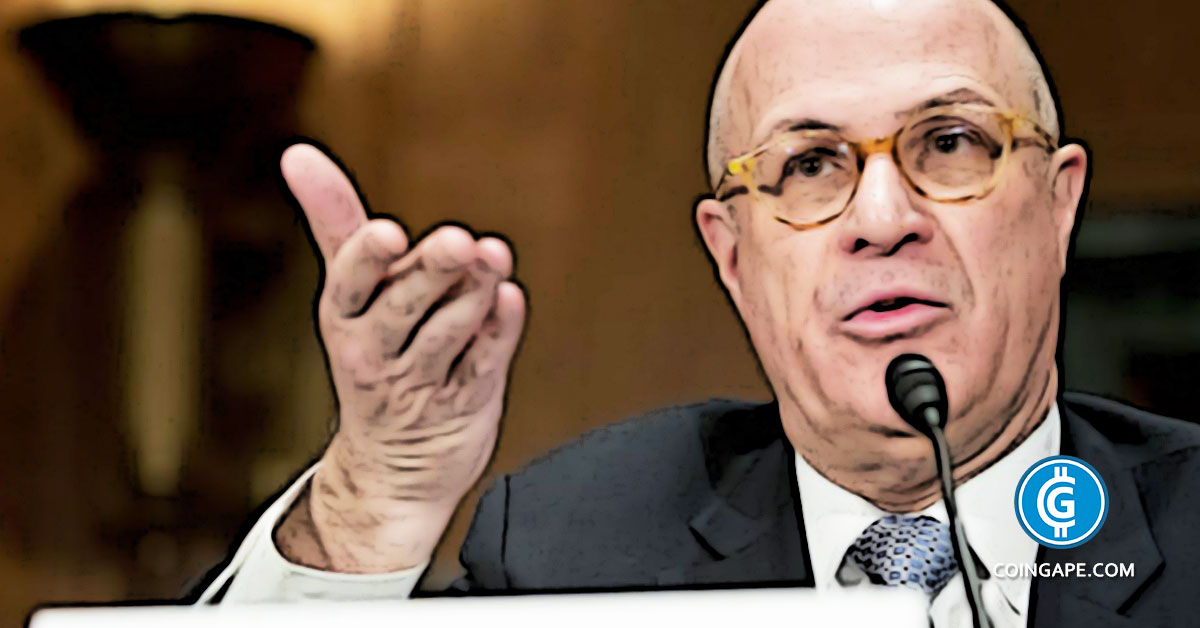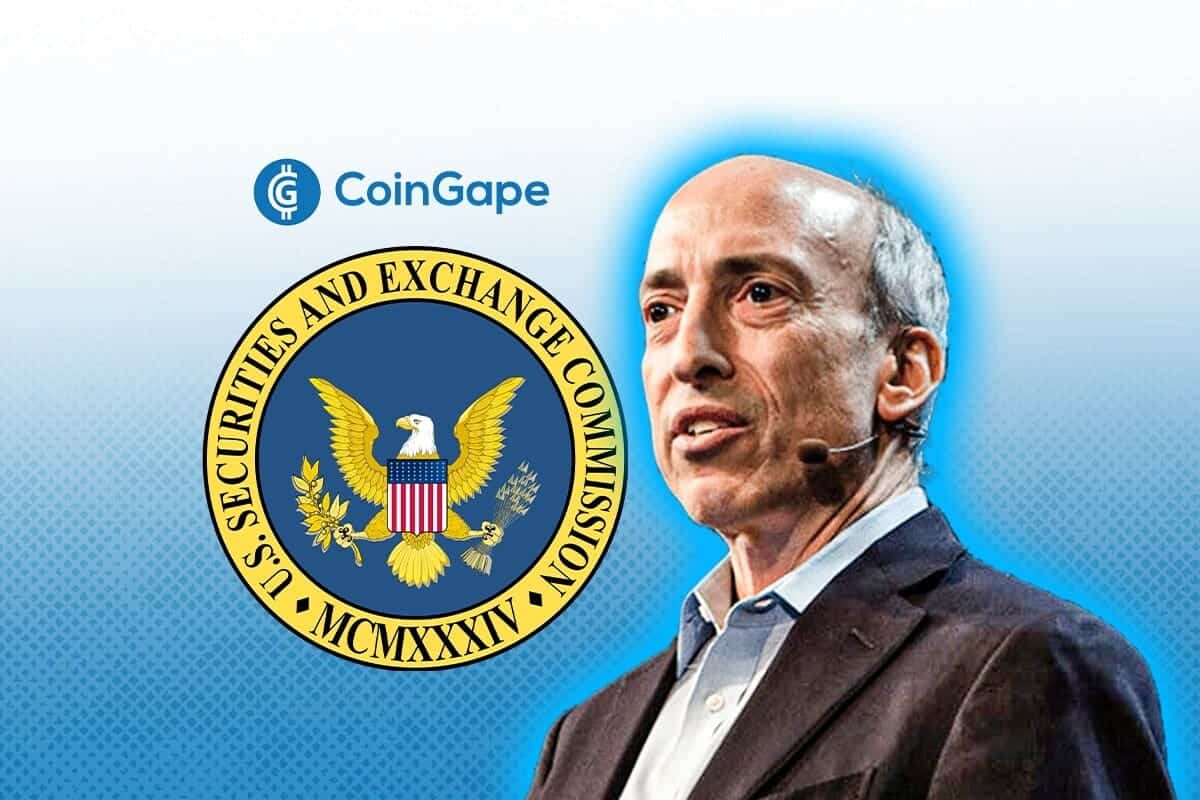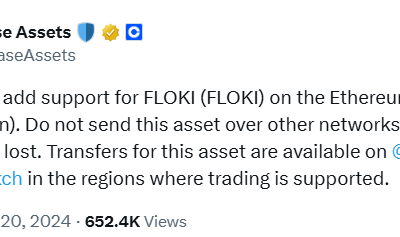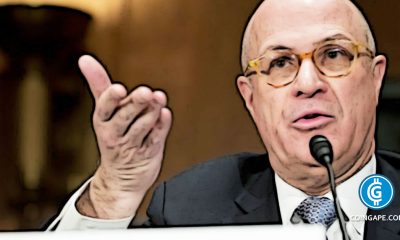Regulation
Coinbase CEO Rallies Efforts For Clear Crypto Rules, Meets Dem & GOP Senators

Coinbase CEO Brian Armstrong has been actively lobbying in Washington, D.C., to promote the establishment of clear regulations for the crypto industry. Over the past 48 hours, Armstrong met with more than a dozen Democratic and Republican Senators. Moreover, he discussed the need for definitive rules and consumer protection in the rapidly evolving crypto space.
Coinbase CEO Seeks Clear Crypto Rules
In a recent post on X, Armstrong shared his optimism about the bipartisan momentum in the U.S. Senate. The particular event he highlighted is the House of Representatives’ passage of the Financial Innovation and Technology for the 21st Century Act (FIT21).
“I met with more than a dozen Dem and GOP Senators in DC over the last 48 hrs to discuss creating clear rules for the crypto industry and consumer protection for crypto users,” Armstrong wrote. In addition, he emphasized the growing bipartisan support for crypto.
The Coinbase CEO stated, “There’s strong bi-partisan momentum to get this done in the Senate now that FIT21 has passed in the House.” The FIT21 Act represents a pivotal step toward establishing a regulated framework for cryptocurrencies.
Earlier, when the House approved the bill with 71 Democrats voting in favor, Armstrong hailed it as a “historic vote.” He believes this legislation will bring much-needed clarity and protection for consumers if it becomes law.
Additionally, Armstrong pointed out that American citizens are eager for their representatives to defend their rights to use cryptocurrencies. Moreover, he spotlighted calls for the implementation of clear regulatory guidelines to prevent misuse by activists targeting the industry.
Armstrong also underscored the role of Stand With Crypto, a crypto advocacy group founded by Coinbase, in advocating for sensible regulations. According to him, the House vote is a rebuke to efforts aimed at undermining crypto technology. Moreover, he expressed confidence that this crypto voters will remember this outcome during the upcoming elections.
Also Read: Joe Biden Faces Backlash For Accepting Bitcoin And Crypto Donations
Biden Administration’s Shift In Crypto Stance
In a notable shift, the Biden administration is reportedly in discussions with crypto industry stakeholders about accepting cryptocurrency donations through Coinbase Commerce. This platform, which supports multiple cryptocurrencies, is already used by the pro-crypto candidate Donald Trump‘s campaign for digital contributions.
Furthermore, the Coinbase CEO’s efforts toward clear crypto rules might also be recognized amid the shift in stance. Recently, sources familiar with the Biden campaign revealed that these discussions are part of a broader strategy to court crypto-focused voters in anticipation of a tightly contested election.
An anonymous source explained, “They’re paying attention to issues around crypto and are trying to find quick wins to show that they’re supportive of the industry.” This change comes in the wake of backlash against the administration for blocking a bipartisan effort to repeal SAB 121.
The Biden campaign has faced criticism for its previous stance on cryptocurrencies but is now engaging strategically with the crypto community. Crypto-backed super PACs, reportedly holding a $100 million war chest according to Open Secrets data cited by Public Citizen, are gaining influence in politics. Whilst, the discussions around crypto donations via Coinbase is in the “explanatory” phase.
Also Read: Coinbase: US Crypto Developers Losing Market Dominance Despite Corporate Demand
The presented content may include the personal opinion of the author and is subject to market condition. Do your market research before investing in cryptocurrencies. The author or the publication does not hold any responsibility for your personal financial loss.
Regulation
“Crypto Dad” Chris Giancarlo Emerges Top For White House Crypto Czar Role

Chris Giancarlo, widely known as “Crypto Dad,” has emerged as the leading candidate for a newly proposed role of crypto czar in the White House under President-elect Donald Trump’s administration. The potential appointment underscores a strategic effort to advance crypto regulations and foster blockchain innovation in the United States.
This proposed position would be the first of its kind in the White House, aiming to bring clarity to the growing $3 trillion digital asset market. Chris Giancarlo, the former Chair of the Commodity Futures Trading Commission (CFTC), is known for his progressive approach to digital currencies and blockchain technologies.
Chris Giancarlo Leads Race for White House Crypto Czar Role Under Donald Trump
According to a Fox Business report, Chris Giancarlo is the top contender for the position of White House crypto czar, a role being considered by the Trump transition team to streamline crypto regulations and foster blockchain development.
As CFTC Chair from 2017 to 2019, Chris Giancarlo oversaw critical advancements in the digital asset space. This includes the launch of the first Bitcoin futures. He later co-founded the Digital Dollar Project, a nonprofit initiative exploring the potential of a U.S. central bank digital currency (CBDC). Giancarlo’s regulatory expertise and understanding of digital innovation position him as a key figure in shaping the future of the crypto sector.
The Trump administration aims to utilize this position to address industry concerns over the Biden administration’s perceived heavy-handed enforcement. The crypto czar would also collaborate with federal agencies to establish a framework for the $180 billion stablecoin market and enhance the overall regulatory landscape for blockchain and digital currencies.
Trump’s Strategic Approach to Digital Asset Policy
President-elect Donald Trump has expressed plans to make the U.S. a global leader in cryptocurrency and blockchain innovation. Part of this strategy includes appointing a crypto czar to advance policies to support the industry’s growth.
Trump has also proposed the establishment of a presidential crypto advisory council to address ongoing regulatory challenges. This initiative aims to align federal policies with industry needs, fostering a competitive environment for blockchain businesses. The council will explore the creation of a Bitcoin reserve as part of the administration’s broader crypto policy agenda.
The transition comes as current SEC Chair Gary Gensler announced his resignation effective January 20, 2025, coinciding with Trump’s inauguration. Gensler faced criticism during his tenure for his enforcement-driven approach to crypto regulations.
Amid speculation, Chris Giancarlo clarified that he is not pursuing the SEC Chair role. Giancarlo said in a recent statement,
“I’ve already cleaned up earlier Gary Gensler mess at the CFTC and don’t want to have to do it again.”
His focus remains on advancing crypto-friendly policies through a potential new role. According to the report, the “Crypto Dad” stated,
“I would be honored to be considered for the role.”
The creation of the crypto czar position could mark a pivotal moment in the evolution of U.S. crypto policy. With Chris Giancarlo leading the race, the industry anticipates advancements in crypto regulations under the new administration.
Disclaimer: The presented content may include the personal opinion of the author and is subject to market condition. Do your market research before investing in cryptocurrencies. The author or the publication does not hold any responsibility for your personal financial loss.
Regulation
UK to unveil crypto and stablecoin regulatory framework early next year


- The UK will introduce unified crypto regulations, including stablecoins, in early 2025.
- New rules aim to simplify oversight and avoid restrictive staking classifications.
- Labour government aims to compete with EU’s MiCA rules and US pro-crypto policies.
The United Kingdom is set to introduce a comprehensive regulatory framework for cryptocurrencies, stablecoins, and crypto staking services in early 2025, marking a pivotal shift in its approach to digital assets.
The announcement was made by the Economic Secretary to the Treasury Tulip Siddiq at City & Financial Global’s Tokenisation Summit in London on November 21.
Initially slated for December 2024, the regulatory rollout was delayed due to the change in government following the election of Prime Minister Keir Starmer’s Labour administration in July 2024.
The upcoming UK crypto regulatory framework
The upcoming framework consolidates regulations for crypto assets into a single, overarching regime, a decision Siddiq described as “simpler and more logical.”
The framework aims to provide clarity in a rapidly growing sector that has faced uncertainty in the UK.
Stablecoins will receive distinct treatment under these regulations, as their functionality does not align with existing payment services rules.
Siddiq highlighted that staking services would also avoid being designated as “collective investment schemes,” a classification that could impose burdensome restrictions.
UK aims to align with the global crypto regulatory landscape
The UK government’s renewed focus on digital asset regulation comes as it seeks to align with global developments. The European Union’s Markets in Crypto-Assets (MiCA) regulations will be fully enforced by the end of 2024, offering regulatory certainty that has positioned Europe as an attractive market for the crypto industry.
Meanwhile, the US, under President Donald Trump’s administration, has adopted a markedly pro-crypto stance, including the establishment of a White House “crypto czar” and SEC Chair Gary Gensler’s planned departure in January 2024.
The Labour government has shown its intent to catch up with international competition. In September 2024, it introduced a bill recognizing NFTs, cryptocurrencies, and carbon credits as property.
The new regulatory push reflects the UK’s ambition to regain credibility as a crypto hub while addressing criticisms of the Financial Conduct Authority’s perceived stringent oversight.
By delivering a robust, streamlined framework, the Labour government aims to bolster the UK’s standing in the multibillion-dollar crypto industry.
Regulation
Gary Gensler To Step Down As US SEC Chair In January

In a recent development, the US Securities and Exchange Commission (SEC) announced that Gary Gensler will step down from his position next year. This follows calls for Gensler to resign since Donald Trump won the US presidential elections.
Gary Gensler To Step Down As US SEC Chair
The US SEC announced in a press release that Gary Gensler will depart the Agency on January 20, 2025. The US SEC Chair also confirmed this development in an X post. Interestingly, this comes on the same day that Donald Trump will be inaugurated as the 47th president of the United States.
Following the announcement, Gensler also used the opportunity to reflect on his time at the Commission. He remarked that it has been an “honor of a lifetime” to serve alongside those at the SEC. He also thanked President Biden for the opportunity to serve in the position. Gensler has been the US SEC Chair since April 2021. During his time, he has spearheaded several litigations against the crypto industry.
This includes the long-running legal battle with Ripple, which Gensler took over from his predecessor Jay Clayton, which bordered on whether XRP was a security. Up till now, the Agency continues to reiterate this ‘digital asset securities’ claim.
Disclaimer: The presented content may include the personal opinion of the author and is subject to market condition. Do your market research before investing in cryptocurrencies. The author or the publication does not hold any responsibility for your personal financial loss.
-

 Ethereum24 hours ago
Ethereum24 hours agoFundraising platform JustGiving accepts over 60 cryptocurrencies including Bitcoin, Ethereum
-

 Market20 hours ago
Market20 hours agoSouth Korea Unveils North Korea’s Role in Upbit Hack
-

 Market15 hours ago
Market15 hours agoETH/BTC Ratio Plummets to 42-Month Low Amid Bitcoin Surge
-

 Market24 hours ago
Market24 hours agoLitecoin (LTC) at a Crossroads: Can It Rebound and Rally?
-

 Altcoin22 hours ago
Altcoin22 hours agoWhy FLOKI Price Hits 6-Month Peak With 5% Surge?
-

 Bitcoin15 hours ago
Bitcoin15 hours agoMarathon Digital Raises $1B to Expand Bitcoin Holdings
-

 Altcoin20 hours ago
Altcoin20 hours agoVitalik Buterin, Coinbase’s Jesse Pollack Buy Super Anon (ANON) Tokens On Base
-

 Altcoin15 hours ago
Altcoin15 hours ago5 Key Indicators To Watch For Ethereum Price Rally To $10K





















✓ Share: